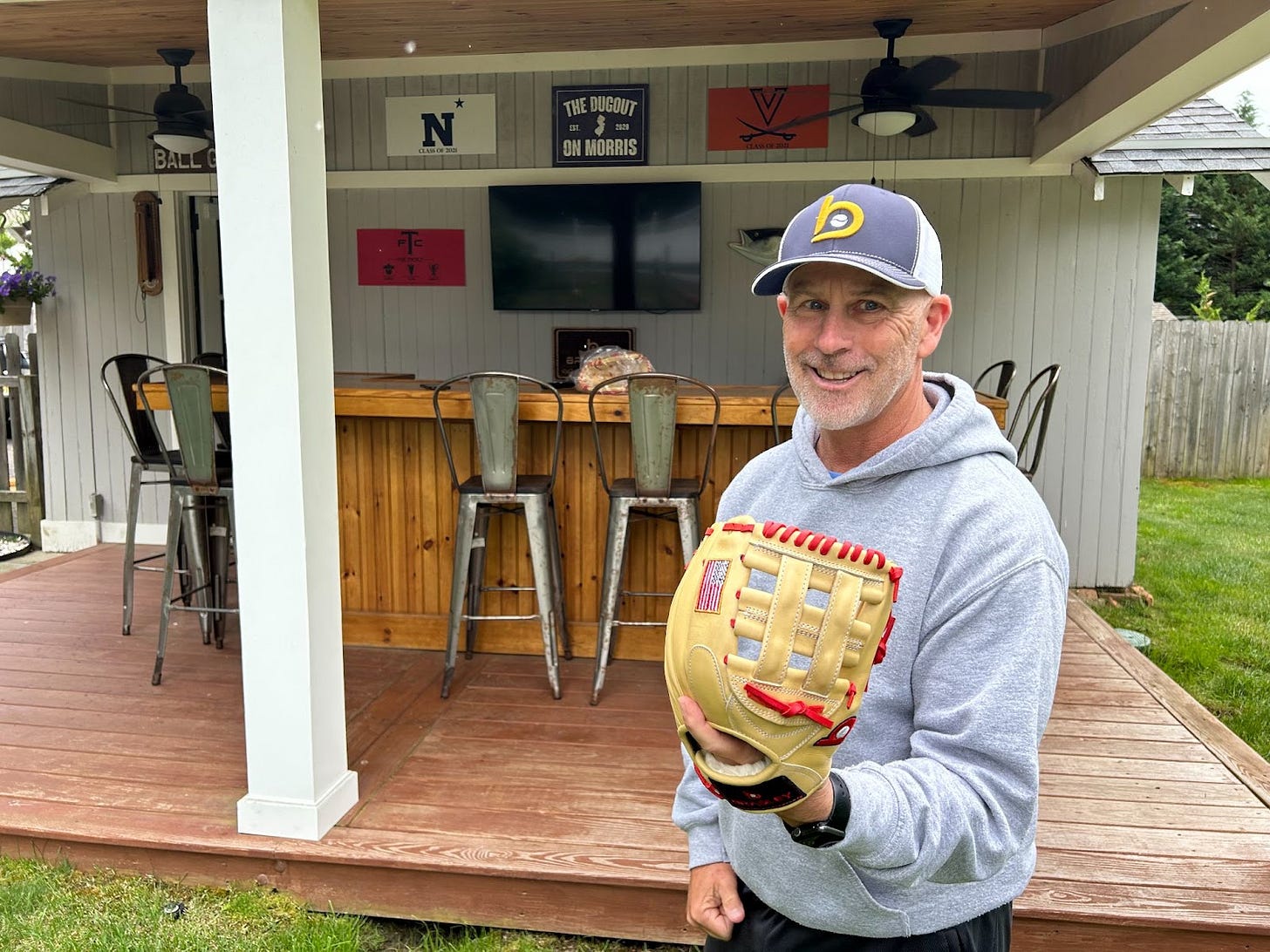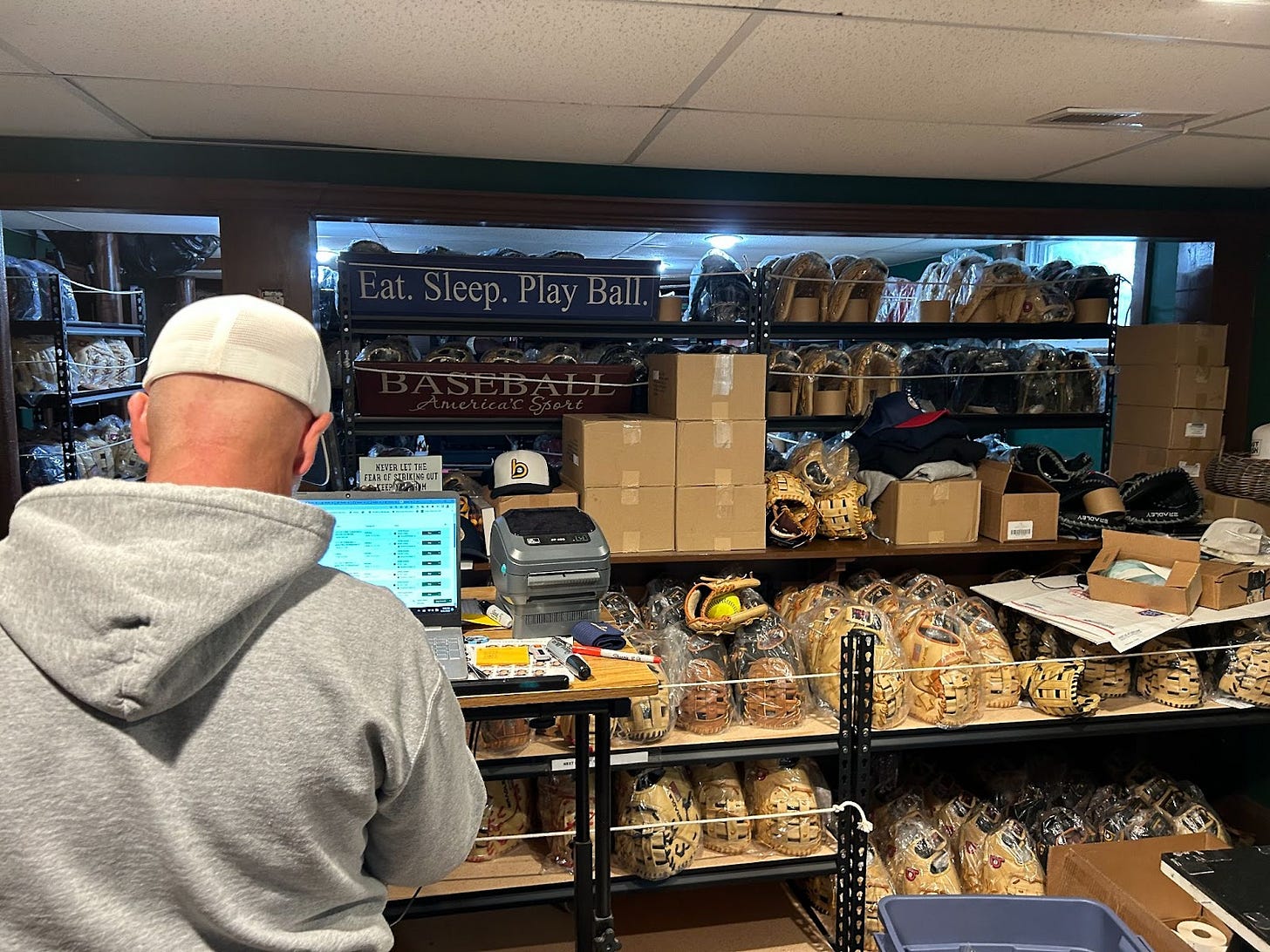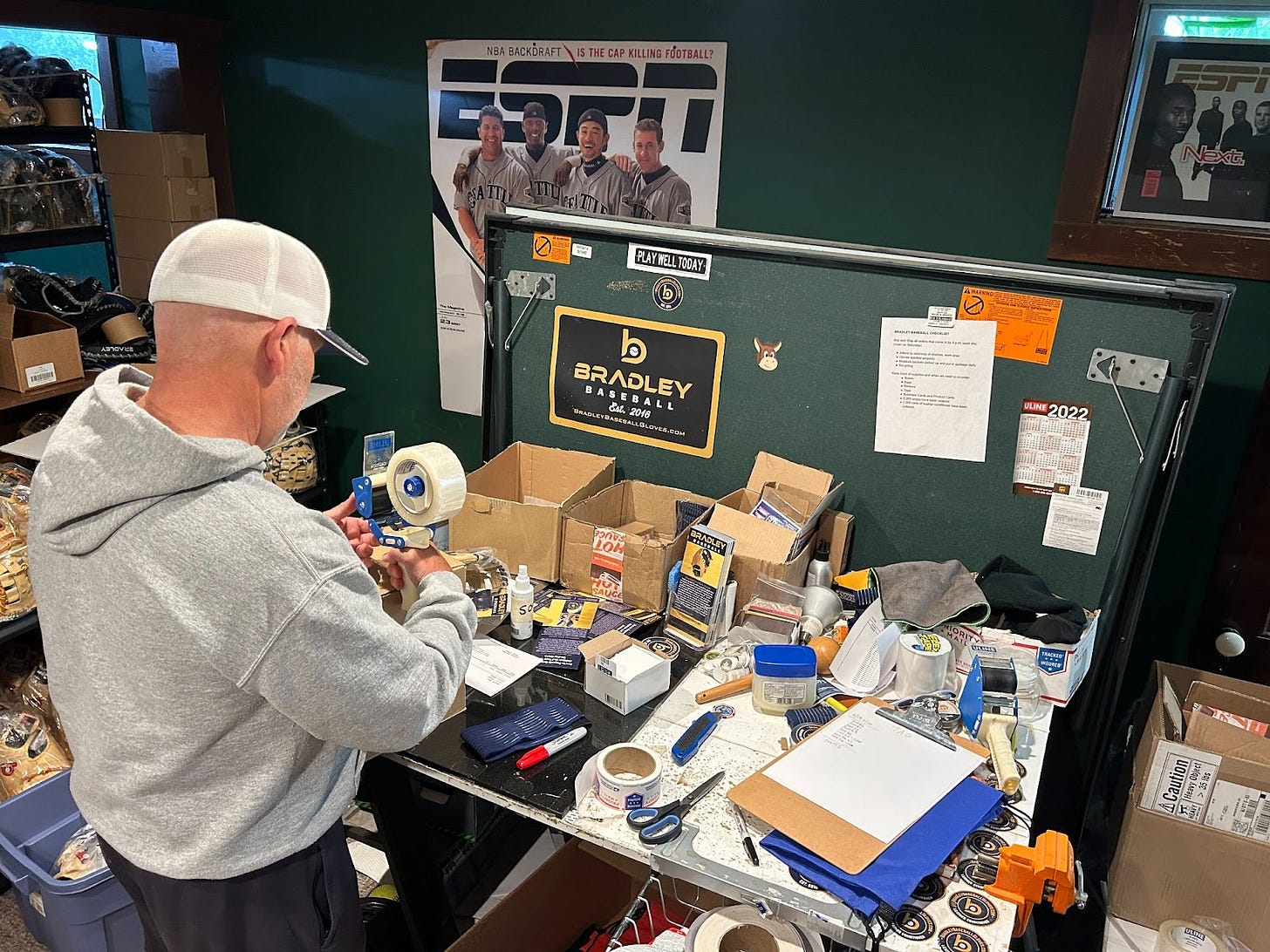Bradley Baseball Gloves, with a Quick First Step and a Leaping Grab, Emerges from a Former Sportswriter's Basement
"Here I am, running a multi-million-dollar business out of my house. It’s a dream," says Jeff Bradley.
(Originally published in September of 2023)
MANASQUAN, N.J. – The basement of Jeff Bradley’s home by the Jersey Shore is part man cave, part fulfillment center. ESPN Magazine cover stories he wrote on Ken Griffey Jr. and the 2001 Seattle Mariners grace the walls. A sign reads, “Eat. Sleep. Play Ball.” Another: “Baseball - America’s Sport.”
It feels a little cramped, though. There are gloves everywhere.
Baseball and softball players adore their leather, a distinctive tool in every player’s toolkit, from tee-ball to the majors. The leather holds memories of backyard catches between fathers and sons, mothers and daughters. The smell emits nostalgia. When you fall in love with a glove, you want to keep it forever. The glove fits into the art and craft of the game.
Bradley, a former baseball and golf writer at ESPN, always loved gloves. He remembers sleeping with his new gloves as a young boy, breaking them in so they “feel like part of your hand,” and rubbing oil on them to make them less stiff. Gloves remind him of his childhood, spent on a baseball field.
“I had rubber-coated balls I’d throw against the wall on the beach, making diving catches,” says Bradley, 59, who started covering baseball for Sports Illustrated in 1989. “But as a sports writer, when you’re around the game every day, it’s pretty easy to get jaded about baseball. I definitely had gotten jaded about baseball. But this takes me back to something as simple as being a boy with a baseball and a new glove. That brought me so much happiness.
“This has made me love baseball again.”
“This” is the multi-million dollar glove business he runs out of his basement. He does no advertising. There’s no sales team, no designers, no brick-and-mortar retail presence. Just Bradley, his gloves and his love for the game. Six and a half years ago, he founded Bradley Baseball Gloves as a side project, chasing an itch to improve the quality of youth baseball gloves. He’s since sold more than 30,000 gloves (12,000 last year), including to the children of 2012 Gold Glove third baseman Chase Headley and former Texas Rangers outfielder Rusty Greer, who told Bradley, “They’re the best youth gloves I’ve ever seen.”
Bradley’s childhood enthusiasm informed his business. He thinks the right glove could help a child catch better, build confidence and fall in love with the game. Bradley coached his sons’ Little League teams, but he noticed they were playing with ill-fitted gloves that were either too big, stiff, or uncomfortable. The palm of the gloves were mushy and the shape “always felt wrong.”
While coaching his kids, Bradley questioned why parents spent $300 on new bats and only $30 on gloves. He didn’t act on his glove idea then.
But by 2013, he’d been laid off twice, first from ESPN, then from The Star-Ledger, and he was looking for something meaningful to pursue. He worked odd jobs, including as a locker room attendant at a golf club. He tried selling cars.
“I was really just floundering and freelancing,” he says. “I was really hurting.”
In 2016, Bradley landed a job leading the communications department for the MLS’s Toronto FC. For years, he flew back and forth between New Jersey and Toronto. But even as his children grew older, the dream for a baseball glove company didn’t fade. Through a connection, he contacted a manufacturer to make gloves exclusively for young players. For 18 months, Bradley tweaked the glove’s design to his liking. The manufacturer said the minimum initial order had to be 600 gloves. He'd consider it a win if he broke even on the first order in early 2017. He didn’t expect to succeed, but felt it was worth trying.
Bradley’s goal: A new glove that feels close to a hand-me-down. He chose a glove with “a soft but supple leather, and by enforcing the palm area and by using stiff inserts in the pinkie and thumb.” While Rawlings and Wilson focus on adult and pro gloves, Bradley would focus on kids between 8 and 15. He wanted to sell a glove that got kids excited about playing again.
“I said to my wife, I think my goal is that nobody’s ever going to be able to lay me off again,” Bradley says. “I call the shots.”
First, he posted in Facebook groups. He started selling a glove here and there, but then it started picking up around the middle of the year. Inspired by Nike founder Phil Knight’s memoir, Shoe Dog, Bradley created scarcity: When a glove sells out, he doesn’t restock them. He redesigns them and creates something new. Now, he sells softball gloves, too, with most in the $150-$200 range. Bradley reflected on his side project five months in, noting the response had been “overwhelming.”
“The photos you are sending me of your kids, smiling with their new (or game-used) Bradley Glove give me goosebumps,” he wrote on his website in 2017. “Seriously, I am living the dream.”
Most days, Bradley wakes up around 5:30 a.m. He logs onto his computer to check how many sales registered overnight. After a four-mile walk to the beach and back, he prints out packaging slips, packs the gloves, and readies them for shipment. He used to drive to a local batting cage, where he'd turn on some music, crank the pitching machine, and catch baseballs for hours until he deemed gloves broken in. He's since outsourced that step as his business has grown.
Bradley is a glove connoisseur who can talk for hours about sizing, leather, feel, webbing, pocket, heel pad and lacing. Yet his kids played with hand-me-down-gloves, including a few disposable youth gloves he bought at Target for $12. They didn’t get a nice glove until they reached high school.
He comes from a sports family with one brother, Scott, who starred at the University of North Carolina and caught nine years in the Majors, including stints with the New York Yankees and the Seattle Mariners, where he caught Randy Johnson’s 1990 no-hitter. Scott’s coached Princeton University’s baseball team since 1997. His other brother, Bob, has coached soccer in the MLS, Europe and the U.S. men’s national team. Scott helped with his catcher mitt’s designs because he caught in the big leagues, and he recalled that former All-Star pitcher David Cone approached him at a recent Old-Timers’ Day to compliment his brother.
“Man, that’s so cool what Jeff’s doing with those baseball gloves,” Bradley recalls Cone telling his brother.
“The growth has been mind-boggling because I have no idea what I’m doing,” says Bradley, who's on pace for his best year yet. “In the beginning, I thought I’d have to go to lemonade stands and tournaments.” (He did attend one at the Ripken Experience in Maryland, only to sell just 10 gloves, a “disaster” that drove him to double-down on online sales.)
A few years ago, some of Bradley’s writer friends posted on Facebook the best stories they’d written that year. After several posts, Bradley wrote one, too. “I don’t know what got into me, but I said, ‘The best story I wrote was the one I wrote about myself.’”
“Sometimes, I guess you need to leave your cocoon or challenge yourself to do something you didn’t think you were capable of,” Bradley says. “I have no business background at all.








Wow Jeff! Never imagined you would identify an opportunity to support future little leaguers. Great stuff and kudos to the kid from West Essex High!